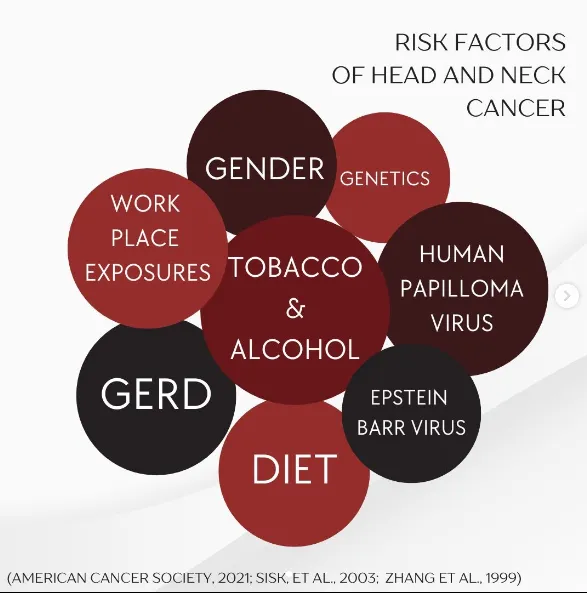Today, I want to talk about something really important – the risk factors of head and neck cancer. It’s a topic that doesn’t get as much attention as it should, but understanding these factors can help us take better care of our health. So, let’s dive in and explore the various things that can increase the chances of developing head and neck cancer.
This article talks about the role an SLP plays in the diagnosis of head & neck cancer.
Tobacco and Alcohol: Major Culprits
Historically, tobacco and alcohol have been considered the leading causes of head and neck cancer, especially when it comes to laryngeal cancer. If you smoke cigarettes, cigars, or pipes, or if you chew tobacco, your risk naturally goes up. And if you also consume alcohol, the risk is even higher. In fact, those who smoke and/or drink are 30 times more likely to develop head and neck cancer compared to those who don’t indulge in these habits. So, it’s definitely something to be mindful of.
Viral Infections: HPV and EBV
Viruses can also play a significant role in the development of head and neck cancer. One such virus is the human papillomavirus (HPV), which can increase the risk of oropharyngeal cancers. Approximately 25% of head and neck cancers are caused by HPV, and the risk is even higher when combined with other factors like tobacco use. Another virus, the Epstein Barr Virus (EBV), has a higher correlation with nasopharyngeal cancers. In fact, studies have shown that EBV is present in 68% of cases of nasopharyngeal cancer. So, it’s important to be aware of these viral infections and their potential impact.
Workplace Exposure to Toxins
Workplace exposure to toxins can also increase the risk of developing head and neck cancer. If you’re exposed to substances like asbestos or have prolonged and intense exposure to dust, paint, or fumes, you may be at a higher risk. It’s crucial to take necessary precautions in your work environment and make sure you’re protected from these harmful substances.
Genetic Factors
Genetics can also play a role in your risk of developing head and neck cancer. People who have conditions like leukemia or aplastic anemia have been shown to have a higher risk. So, if you have a family history of these conditions, it’s a good idea to be extra vigilant about your health.
Demographics: Age and Gender
When it comes to demographics, age and gender can impact the risk of head and neck cancer. Men are four times more likely to develop head and neck cancer compared to women. The typical age of onset is 55 years or older for most cases. However, we’re now seeing an increase in younger people being affected by HPV-related head and neck cancer. So, age and gender can also play a role in the risk.
Lifestyle Factors
Certain lifestyle factors can contribute to the risk of head and neck cancer. A diet low in fruits and vegetables and gastroesophageal reflux disease (GERD) have been linked to an increased risk. It’s important to maintain a healthy diet and manage any digestive issues you may have to reduce your risk.
Conclusion
In conclusion, understanding the risk factors of head and neck cancer is crucial for early detection and prevention. Tobacco and alcohol use, HPV and EBV infections, workplace exposure to toxins, genetics, age, gender, and lifestyle factors can all increase the risk. By being aware of these factors and making healthier choices, we can reduce our risk and take better care of ourselves. Remember, prevention is always better than cure!


Thank You
Great article thank you